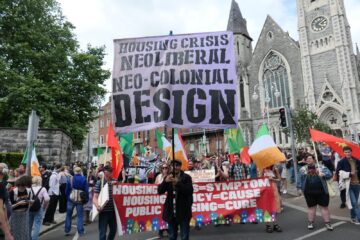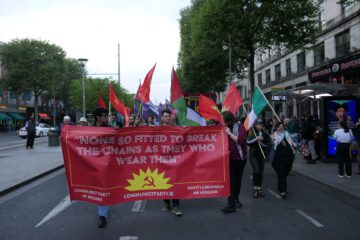The result of the double rejection of the government’s proposed amendments to the Constitution was not totally unexpected. The government tried to gain favour by removing outdated concepts of the family and the domestic role of women from the Constitution, while at the same time trying to place all responsibility for care within the family unit, completely absolving the state of any responsibility towards women as the primary caregivers, the disabled community, and other vulnerable members of society.
The Care amendment was motivated by the discredited ideology of Thatcherism which proclaimed that “there is no such thing as society”. The wording of the proposed amendment, placing the responsibility for the provision of care within the family unit, could not be considered a win for women in a struggle for more equal rights, as it is women who will continue to shoulder the bulk of domestic and caring responsibilities.
Proper and wide-ranging state funded services for families are a necessity for the liberation of women, and to support individuals with additional needs, throughout their life or at any stage in it, such services are critical to facilitate their full participation within our society. This is how we move towards a more equal Ireland, as envisioned in the 1916 Proclamation.
The results rejecting both the Family and Care amendments do not mean that the people accept the current constitutional wording, but rather it is a rejection of the anti-people policies of this aggressive pro-capital, pro-big business neoliberal government.
Our people want housing, not excuses. There is a clear majority in support of building more public housing and placing restrictions on vulture funds investing in our housing stock. The people want rent controls and tenure protections, more regulation of landlords, and the barring of corporate vulture funds. They want a decent public health service, instead of the present situation which sees people suffering on long waiting lists or receiving medical care in a hospital corridor on a trolly or a chair. People are tired of being ignored when they ask questions and want answers about issues that may affect their communities, issues which all centre on a lack of properly funded services in their communities. They support neutrality and want a stronger position on the genocide in Gaza, and they are no longer impressed by our “partners in the EU”.
No doubt the establishment media and middle-class professional NGO sector, which has been hopelessly compromised for decades and perceived by many working people as conduits for imposing government policies, will criticise the people for making the “wrong” decision, which begs the question ‘the wrong decision for whom?’
The result is a clear warning to those parties and organisations who claim to be on the “left” that politics is more than trendy soundbites; that social policies are not the same as class politics. Real change will not come from the current institutions of power. It will only come by the mobilisation and radicalisation of the working class.
The many problems that our people face will not be solved within the institutions and the economic system that causes them. What is needed is a radical transformative strategy centred on the needs and interests of the working class.









